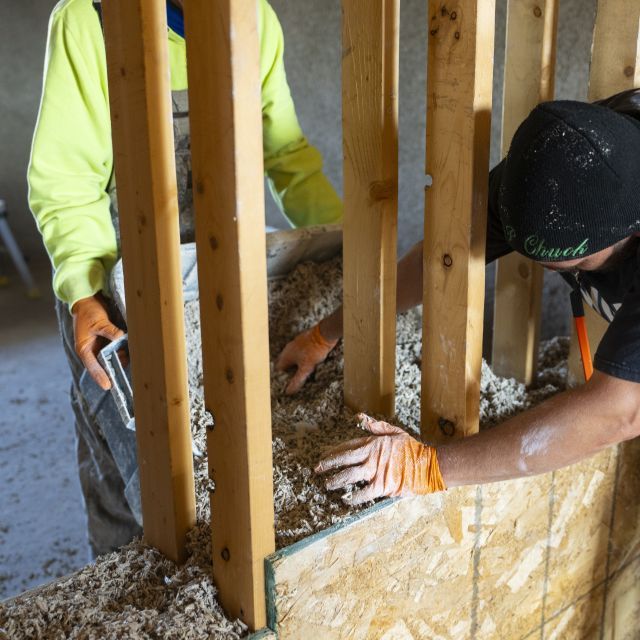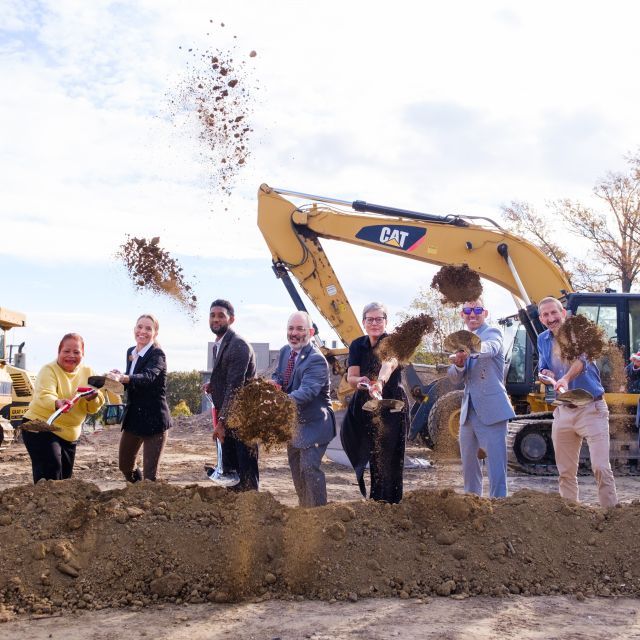The United Nations’ Intergovernmental Panel on Climate Change report has dominated headlines with a now-or-never warning for immediate action to avoid catastrophic consequences for people and the planet.
This year’s Earth Day theme is “Invest in Our Planet" – to accelerate solutions to combat climate change. It also carries an important challenge for everyone to have the “unstoppable courage to preserve and protect our health, our families and our livelihoods.”
We couldn’t agree more.
How We Are Building a More Sustainable and Resilient Future
This spring, our President and CEO Priscilla Almodovar spoke with President Clinton about how current climate events impact our country, especially low-income families and communities of color, and why we created and advocate for a green building standard for affordable housing that helps build sustainable communities.
We continue to invest in that standard, Enterprise Green Communities, which we launched in 2004 to bring the benefits of a green economy to people living in affordable housing. To date, we have certified affordable housing developments to Green Communities standards in nearly every state and have invested more than $3.9 billion in the development and preservation of more than 130,000 green affordable homes nationwide. The impact has been substantial.
Each year, Green Communities-certified developments save $31.8 million in utility costs alone. And since 2004, certified developments have saved more than 14.9 billion gallons of water – that’s more water than is needed to fill 22,000 Olympic-sized swimming pools. Each year, Green Communities-certified developments reduce carbon emissions by the equivalent of taking nearly 20,000 cars off the road. As affordable housing providers, we have an opportunity to build and design properties like these that not only house people in need, but also protect the environment.
We also recognize how critical it is to prioritize the unique needs of the affordable housing sector as we transition away from fossil fuels. We’re committed to helping craft a sector-wide approach that achieves equitable decarbonization in affordable housing so that owners and residents of affordable housing are set up to thrive.
And in addition to solutions that reduce the impact affordable housing has on the climate, we’re just as focused on housing solutions that protect people from the impacts of climate change. Through our disaster resilience programming, we are supporting communities as they prepare for and respond to climate events through trainings, tools and funding, including Keep Safe Florida, which kicks off May 5, the Disaster Recovery Accelerator Fund and our climate resilience academies.
Cross-sector Solutions to the Climate Challenge
While the climate change challenge may seem overwhelming, we are encouraged by the next-generation solutions we see in the field. Some of the most innovative new ideas, such as those from winners of the Housing Affordability Breakthrough Challenge – which we lead with support from Wells Fargo – include Forterra’s Forest to Home model, cdcb | come dream. come build.’s MiCASiTA innovation and Gulf Coast Housing Partnership’s Health + Housing model.
Collaborations and cross-sector partnerships like these are critical to providing a positive path forward for the climate change and sustainability issues that are facing the affordable housing and community development fields.
Through our six-year collaboration with the Strong, Prosperous, And Resilient Communities Challenge, we’ve partnered with LIIF and NRDC to support local organizations in six cities as they confront the legacy of racial inequity, health disparities and climate change through community-based solutions.
And with the International Well Building Institute, we awarded our first joint certification to a Bronx development that met integrated criteria to ensure affordable homes advance health outcomes while promoting environmental sustainability.
But these programmatic solutions are only one piece of the climate action we need.
Government Action is Needed to Fight the Effects of Climate Change
Through our federal policy advocacy, we are pushing for reforms that would improve disaster recovery programs to ensure historically marginalized communities have access to resources and assistance after disasters, while also supporting them in mitigating climate risk.
Enterprise strongly supports the permanent authorization of the Department of Housing and Urban Development’s Community Development Block Grant – Disaster Recovery program (CDBG-DR) through the bipartisan Reforming Disaster Recovery Act, which would improve outcomes for families across the country by providing long-term recovery funds to disaster-stricken communities in a more efficient and equitable way.
The legislation also promotes disaster mitigation and resiliency by creating a significant set-aside for mitigation activities and specific minimum construction standards for areas designated as hazard prone. This would allow states and localities to rebuild in a stronger, safer and forward-facing manner, so that federal dollars do not put people back in harm’s way.
Although CDBG-DR has become a critically important resource for communities recovering from natural disasters, the program is currently unauthorized – meaning Congress must vote on a new appropriation each time it needs to activate the program. As a result, recovery timelines are lengthened, economies stagnate and homelessness and out-migration from disaster-impacted areas increase.
This Earth Day, we urge you to reach out to your representatives in Congress and ask them to support the Reforming Disaster Recovery Act.
Our planet is our home. For Enterprise, the meaning of Earth Day’s “Invest in Our Planet” theme could not be clearer, and we will continue to deliver on that call to action throughout the year.


